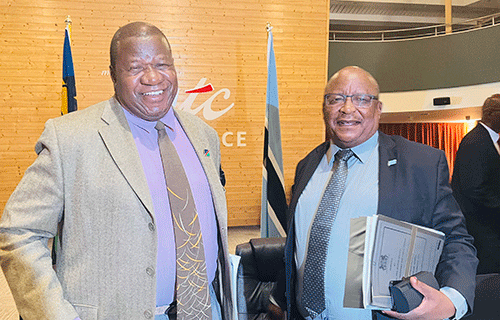SWAKOPMUND – African companies have shown interest in being part of the long-awaited Botswana-Namibia multi-billion-dollar railway project.
The two countries after a long delay decided to go ahead with the construction of the Trans-Kalahari railway, which will go beyond western Botswana to the Namibian border
At least 12 international companies,
three representing Namibia and Botswana, have expressed interest in participating in the project expected to kick off in 2025.
Expressions of interest for investors were called last year and ended in November.
The Trans-Kalahari railway, which will extend beyond western Botswana to the Namibian border, is anticipated to boost both trade and tourism.
Goods to be transported will mainly include coal and copper from Botswana to the Namibian port of Walvis Bay for export, as well as imported freight destined for Botswana, South Africa, and nearby landlocked countries.
An agreeement for the railway line was signed in 2010, and a pre-feasibility study was concluded in 2011. A bilateral agreement was signed in 2014, while a development study was completed in 2016.
Works and Transport Minister John Mutorwa and his Botswana counterpart, Eric Molale, along with a delegation from both countries, discussed the current status of the project in Swakopmund last week. According to Mutorwa, they are both satisfied with the progress made so far.
“It is important that this project is
realised, and we are satisfied with the progress and interest that has been shown not only by our countries but by those that are keen on partnering with us on the project,” Mutorwa said.
A railway exists up to Gobabis, and Mutorwa said this will be extended to the Buitepos Border Post some 100km east of Gobabis.
In Botswana, the new rail link will
run from Mmamabula via Rasesa, to Phuduhudu, then following the Trans-Kalahari Highway to the Mamuno Border Post near Charles Hill into Namibia at Buitepos.
Molale, on his part, said that the project also underlines the excellent bilateral relations that exist between Namibia and Botswana. He added that the project will not only enhance trade between the two countries but could also be the vehicle to promote intra-African trade as more countries could be linked to the project later.
Project manager Cynthia Haimbodi explained to New Era that the current concept of financing being explored by the two countries will ensure that the potential investor will construct, operate, and maintain, and later on transfer ownership to the two countries.
“The idea is that the potential investor will operate the infrastructure for a certain period or until they recoup their investment and then transfer it to Namibia and Botswana. The investor will recoup their investments through the period that they operate it,” she explained.
Dominic Ntwaagae, the project manager from Botswana, also explained that while they have explored options, nothing has been finalised in terms of the funding model.
“Some of the decisions will be made and finalised once we get an investor on board,” he explained. –edeklerk@nepc.com.na



